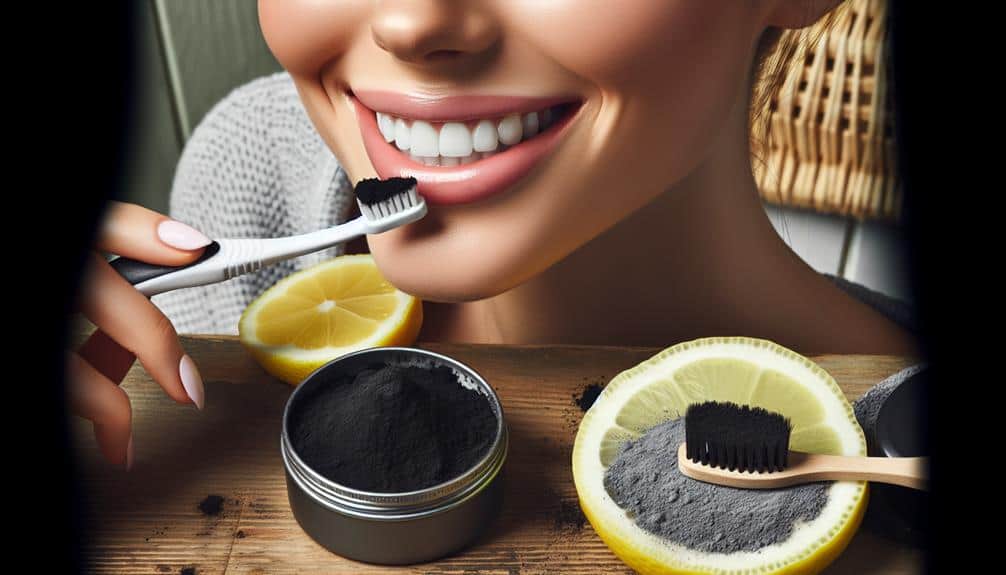Enhance your smile naturally by harnessing the potent teeth whitening benefits of cinnamon. Cinnamon's antimicrobial and anti-inflammatory properties can combat oral bacteria and promote a healthy mouth environment. To create a cinnamon teeth whitening paste, combine cinnamon powder, baking soda, and coconut oil for a gentle exfoliating paste. Apply it to your teeth once or twice a week to avoid enamel damage. Remember, cinnamon is potent, so always perform a patch test and consult your dentist before use.
Utilize cinnamon-infused toothpaste and mouthwash for daily maintenance, and chew on cinnamon sticks for added oral health benefits. Cinnamon offers a natural approach to teeth whitening that has garnered positive results and reviews, making it a safe and effective option for achieving a brighter smile.
Key Points
- Use cinnamon paste with baking soda and coconut oil for gentle teeth whitening.
- Perform a patch test before applying cinnamon to avoid irritation.
- Incorporate cinnamon into oral care routine for its antibacterial and freshening properties.
- Consult a dentist before using cinnamon to ensure it's safe for your teeth.
- Enjoy internal oral health benefits by adding cinnamon to meals or drinks.
Benefits of Using Cinnamon for Whitening
If you're looking for a natural way to whiten your teeth, consider the benefits of using cinnamon as a whitening agent. Cinnamon offers not only a delightful flavor but also various oral health benefits.
Cinnamon mouthwash benefits include its antimicrobial properties that can help fight bacteria in the mouth, reducing plaque and bad breath. Additionally, cinnamon oil benefits encompass its anti-inflammatory properties, which can help soothe gum irritation and promote overall gum health.
Studies have shown that cinnamon contains compounds like cinnamaldehyde, which exhibit antibacterial effects that can contribute to oral health. Using cinnamon in your oral care routine may help in maintaining a healthy mouth environment.
Incorporating cinnamon mouthwash or cinnamon oil into your dental regimen can potentially aid in teeth whitening by combating oral bacteria that contribute to staining and yellowing of teeth. Remember to use cinnamon products in moderation to avoid any potential irritation, and consult with your dentist if you have any concerns about incorporating cinnamon into your oral care routine.
How to Make Cinnamon Teeth Whitening Paste
For creating a homemade cinnamon teeth whitening paste, gather the necessary ingredients and follow a simple recipe to achieve a brighter smile. When making your own paste, make sure you have the right components and follow these steps:
- Ingredients: Collect cinnamon powder, baking soda, coconut oil, and a small container for mixing.
- Recipe: Mix one tablespoon of cinnamon powder, two tablespoons of baking soda, and three tablespoons of coconut oil in the container.
- Consistency: Blend the ingredients until you achieve a smooth paste-like consistency.
- Application: Use a toothbrush to apply the paste gently to your teeth.
- Frequency: Brush with the paste once or twice a week to avoid enamel damage.
When exploring cinnamon paste variations, keep in mind that simple recipes often work best. Additionally, debunk cinnamon whitening myths by understanding that while cinnamon can help brighten teeth, it's not a substitute for professional dental care.
Enjoy experimenting with homemade cinnamon paste while keeping oral health a top priority.
Precautions When Using Cinnamon for Whitening
Taking care when utilizing cinnamon for teeth whitening is crucial to guarantee safe and effective results. Safety precautions should be followed to minimize potential risks associated with using cinnamon as a whitening agent.
Firstly, it's crucial to recognize that cinnamon is a potent spice that may cause irritation or allergic reactions in some individuals. Before using cinnamon for teeth whitening, perform a patch test by applying a small amount of cinnamon paste to your skin to check for any adverse reactions.
Additionally, cinnamon can be abrasive, and excessive scrubbing with cinnamon paste may damage the enamel of your teeth. To prevent this, use gentle pressure when applying the paste and limit the frequency of use to avoid enamel erosion.
Moreover, cinnamon shouldn't be used as a standalone whitening solution. It's recommended to consult with a dentist before incorporating cinnamon into your oral care routine to ensure it complements your overall dental health.
Tips for Maintaining Whiter Teeth With Cinnamon
To maintain whiter teeth with cinnamon, incorporate it into your oral care routine cautiously and consistently. Cinnamon offers numerous benefits for oral health due to its antimicrobial properties and antioxidants that can help in keeping your teeth white and healthy.
Here are some tips to help you maintain whiter teeth with cinnamon:
- Use cinnamon-infused toothpaste: Look for toothpaste containing cinnamon to reap its benefits every time you brush.
- Make a cinnamon mouthwash: Create a mouthwash by mixing warm water with a few drops of cinnamon essential oil for a revitalizing rinse.
- Chew on cinnamon sticks: Chewing on cinnamon sticks can help freshen breath and promote oral health.
- Add cinnamon to your diet: Incorporate cinnamon into your meals or drinks to enjoy its oral health benefits from the inside out.
- Consult a dentist: Regular dental check-ups are essential for maintaining white teeth, so make sure to see your dentist for professional advice and care.
Cinnamon Teeth Whitening Results and Reviews
Achieve brighter smiles and informed decisions by exploring the results and reviews of utilizing cinnamon for teeth whitening. When it comes to cinnamon powder effectiveness in teeth whitening, many users have reported positive outcomes. The fine texture of cinnamon powder allows for gentle exfoliation, which can help remove surface stains on teeth, leading to a brighter smile. Users have noted that regular use of cinnamon as a natural teeth whitening remedy has resulted in noticeable improvements in the color of their teeth.
User experience with cinnamon for teeth whitening has been largely favorable. People have reported that incorporating cinnamon into their oral care routine hasn't only helped whiten their teeth but has also left their mouths feeling fresh and clean. Many users appreciate the natural approach that cinnamon offers compared to commercial whitening products. Overall, user reviews suggest that cinnamon can be an effective and safe option for those looking to brighten their smiles naturally.
Frequently Asked Questions
Can Cinnamon Teeth Whitening Paste Be Used on Sensitive Teeth?
If you have sensitive teeth, it's best to be cautious with cinnamon teeth whitening paste. Consider gentler alternatives to manage sensitivity. Explore other ingredients that promote oral health while still benefiting from cinnamon's advantages.
How Often Should Cinnamon Teeth Whitening Paste Be Applied for Optimal Results?
For best results, apply cinnamon teeth whitening paste every other day. This frequency balances effectiveness without overuse. Be cautious of potential side effects like tooth sensitivity. Prioritize oral health and consult a dentist if concerns arise.
Are There Any Specific Types of Cinnamon That Work Better for Teeth Whitening?
When choosing types of cinnamon for teeth whitening, consider Ceylon cinnamon. Its effectiveness surpasses other varieties due to lower coumarin levels, making it the best choice for your dental health. Explore natural alternatives for brighter smiles.
Can Cinnamon Teeth Whitening Paste Be Used by Children?
Yes, children can use cinnamon teeth whitening paste under parental supervision. Safety is essential for their dental health. Parents should guarantee proper oral care practices and monitor usage to prevent any potential risks or adverse effects.
Is It Safe to Use Cinnamon Teeth Whitening Paste if You Have Dental Fillings or Crowns?
Is using cinnamon teeth whitening paste safe with fillings or crowns? Guarantee the paste doesn't cause sensitivity by minimizing contact with dental work. Careful application can help prevent any adverse effects on fillings or crowns.



